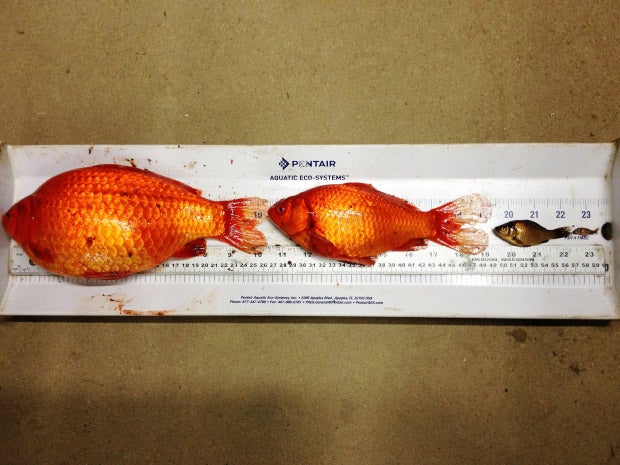Giant goldfish found in Australian rivers after being released by pet owners
Researchers find the invasive species weighing 2kg and up to 30 cm in length

Enormous goldfish and other pet fish have been found in the rivers of Australia by researchers who believe they were released by their owners.
The common misconception of the goldfish as a small, domesticated species best suited to an aquarium has been challenged yet again by scientists who have warned of their damaging impact on natural ecosystems.
Researchers at Murdoch University in Perth have caught goldfish which tipped the scales at up to 2kg and grew up to 30cm.
They have warned that goldfish and other abandoned species such as koi carp are destroying habitats for native breeds of fish by eating their spawn and uprooting plants and sediment on the river bed.
Stephen Beatty, a researcher from the Centre of Fish and Fisheries at Murdoch University, started tagging feral goldfish in the Vasse River near Perth and monitoring their movements.
“We used acoustic telemetry, which is the same technology used to track sharks off the coast, just on a much smaller scale,” he told Perth Now.
“We tracked 15 mature fish over a year and that informed us about where they were going in their breeding period.”
Introduced species such as goldfish could disturb habitat and consume eggs of native fish, said Dr Beatty. They have also been found to spread a disease which affects the skin of native fish.
“They can stir up sediment, increasing turbidity, and they can re-suspend nutrients through their feeding activity because they cruise along the bottom hoovering sediment which can uproot plants as well,” he said.
“The key is really preventing it and getting the message out there that people shouldn’t be releasing freshwater fish in artificial wetlands."
The issue of goldfish growing to unmanageable sizes after being released by disenchanted owners has prompted action by governments around the world, with Canada slapping down a fine of £51,000 for those who release live fish into certain lakes and rivers.
A goldfish measuring 41cm and weighing 2.3kg was found in a pond in Poole in the UK six years ago, while another died after living to an impressive 43 years old.
The largest goldfish recorded was 48 cm long and found in the Netherlands in 2008.
Join our commenting forum
Join thought-provoking conversations, follow other Independent readers and see their replies
Comments
Bookmark popover
Removed from bookmarks